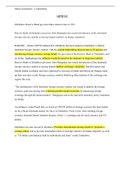Essay
IB Economics IA : Macroeconomics Monetary Policy (Interest Rates)
- Course
- Institution
- Book
This is a Macroeconomics IA based on Monetary policy that received 12/14 from the IB. The IA discusses the analysis and impact of how Zimbabwe’s central bank decided to hike the interest rates to 70% intending to combat sharp collapse in domestic currency, upsurge in inflation, and lighten the im...
[Show more]





